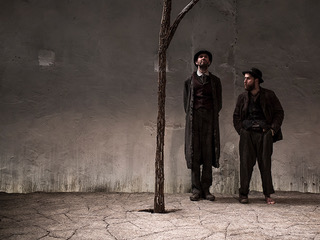
Waiting for Godot is flatly the most important play of the 20th century (the reader will remember that the comparable monuments of modern drama were written at the end of the 19th century). Samuel Beckett’s extended metaphor, often thought abstruse, has been more victimized by wayward criticism than any other modern drama. However, Edward Albee said to me when we discussed it: “If Waiting for Godot had been set in a living room, nobody would have had any trouble with it. It's this fucking blasted heath that got in everybody's way. They see a strange setting, they see something that is not naturalistic, automatically the warning flags go up. They say ‘I'm not going to be able to understand this.’ And therefore, they can't understand it, because they're determined they're not going to.” But more about the setting later. Indeed, Waiting for Godot is the only play I know in which the characters tell us their motivation so explicitly: “It’s so we won’t think. … It’s so we won’t hear. … All the dead voices.” That’s why they talk so desperately. Druid (from Galway, Ireland) has just produced the play as part of Lincoln Center’s White Light Festival. This brilliant production is true in nearly every way to Beckett’s intent. The director, Garry Hynes, stresses the silences in the script, creating a particular minimalism that elucidates each small piece of dramatic action. After all, things do happen in the play, but small things. Leaves appear on the tree, but only three. People do come and go, but only two. Every dramatic impulse that occurs to our anti-heroes, Didi and Gogo—and every moment between those impulses—is examined meticulously. Each beat is crisp, each thought is isolated. The critic Martin Esslin coined the phrase the theatre of the absurd in his book of that name. He wrote that a new style of acting was needed for the new style of drama. And that’s just what Ms. Hynes has directed her actors to give us. Aaron Monaghan as Estragon (called Didi) and Marty Rea as Vladimir (called Gogo) behave like cartoon characters, without inner life, isolating each dramatic beat to make it a frame in a comic book. They have one thought at a time. Their performances are flawless. Ms. Hynes gives us a lot of laughs without ever working for them. They’re organic to the universe these characters live in. Everything’s physicalized, as when Didi helps Gogo put on his boots and Gogo executes a 180 degree turn, simultaneously awkward and graceful, or when they look offstage in silly sort-of-fencing-thrust poses, their hands shielding their eyes from the sun that’s in fact not very bright at all. These smaller-than-life comrades march or traipse or wander around the stage, often arm-in-arm, arguing, comforting each other, slugging their way through conversations to make it through the day together. Garrett Lombard, playing Lucky, and Rory Nolan, playing Pozzo, are likewise perfect in this acting idiom, commanding, funny, bizarre, ranting or slobbering as the occasion demands. The set gives us the single tree that Beckett demands, as well as a single rock. But designer Francis O’Connor has inexplicably backed the stage with marble-looking wall that extends into the wings and up to the fly loft. This is the only liberty the production takes; Beckett tells us that he wants “an open space.” Didi and Gogo look trapped instead of lost, and we lose the sense of existential void. The soft Irish diction of Didi and Gogo creates a distancing effect for New York audiences, and it’s great. What a marvelous production this Waiting for Godot is! What brilliant work from Druid!
